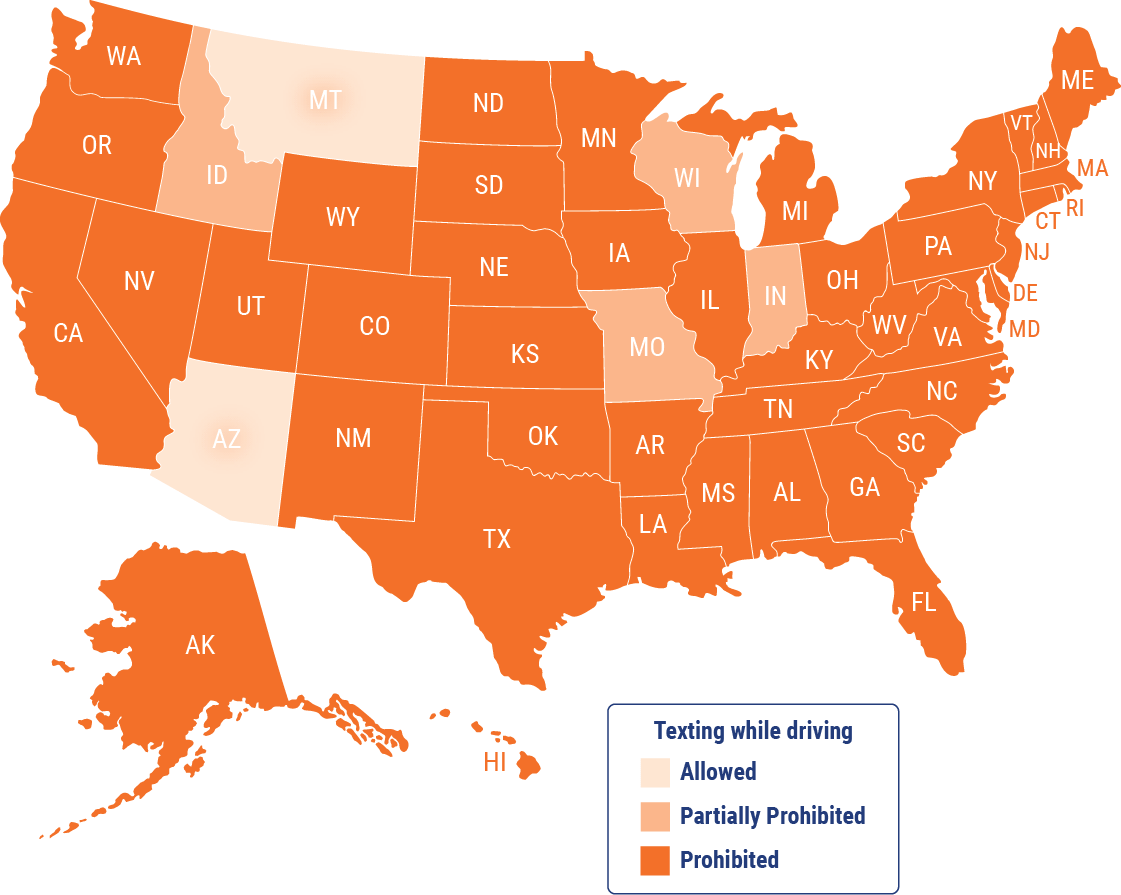Massachusetts Distracted Driving
(It's more than just not texting)

There are roughly 125,000 car accidents every year in Massachusetts. And most of these are simple distracted driving mistakes that are completely preventable.
That’s why arguably THE most important thing you can do behind the wheel is keep your hands at 10 and 2 and your eyes on the road. Always.
What Is Distracted Driving?
Distracted driving refers to any activity that diverts a driver’s attention away from the primary task of driving. But it's not just teen drivers and cell phones, there are three types of common distractions:
- Visual: This is anything that takes the driver’s eyes off the road (like reading a text message or checking your hair in the rear-view mirror).
- Manual: This is anything that takes the driver’s hands off the wheel (like adjusting the A/C or reaching for a dropped object).
- Cognitive: This is anything that takes the driver’s mind off driving (like thinking about an upcoming presentation or having an argument with a passenger).
Most distractions are perfectly legal, but still present a hazard. And right now, Massachusetts lawmakers are focused mostly on preventing accidents related to texting and teen cellphone use while driving.
Distracted Driving Statistics in Massachusetts
You don’t have to follow the local news every night to know that distracted driving is a problem, but here are a few statistics that might help you understand just how serious it is in Massachusetts:
- Massachusetts’ Safe Driving Law has banned texting while driving since 2010.
- In its first year of enforcement, police issued 274 citations for violations.
- Since then, citations have increased incrementally, with 1,153 citations issued in 2011; 3,399 issued in 2013; and 6,131 issued in 2015.
- Despite enforcement of this ban, the number of distracted driving crashes in Massachusetts increased 170% between 2014 and 2016.
Does Massachusetts Have Laws against Distracted Driving?
Yes.
Currently, Massachusetts has the following prohibitions:
- Reading, writing, or sending text messages while behind the wheel is prohibited for all drivers.
- Engaging in internet-related activities while behind the wheel is prohibited for all drivers.
- Drivers under the age of 18 are prohibited from using cell phones and mobile electronics while driving, even if in hands-free mode.
- School bus operators and other public transit drivers are prohibited from using cell phones while driving.
The state House and Senate are each working on bills that would also make the use of handheld devices illegal while driving. While each chamber seeks the same goal, so far they've disagreed on the finer points of the law and been unable to pass further restrictions. However, it's very likely that handheld devices will be made illegal in the near future.
Massachusetts compared to the rest of the US on texting and driving restrictions

Every state in the US has a law that prohibits some sort of cell phone usage except Montana and Arizona. But in 2021, newly enacted cell phone restriction laws will go into effect in Arizona.
Are There Any Exceptions to the Distracted Driving Laws in Massachusetts?
Yes.
As of now, the only exception to the state’s distracted driving law is for the purpose of reporting an emergency. But the state still encourages drivers to pull over and stop the vehicle before reporting the emergency if possible.
Massachusetts Distracted Driving Laws at a Glance
| Yes | No | |
| Is texting while driving legal? | X | |
| Can you send/receive texts at a red light? | X | |
| Is handheld device use permitted? | X | |
| Any special restriction for young drivers? | X | |
| Is headphone/headset use permitted? | X * |
* Headset use is legal only when used for navigational purposes.
Is It Legal to Eat a Cheeseburger while Driving in Massachusetts?
Yes. But that doesn't mean it's a good idea.
Distracted driving comes in many forms, and eating a cheeseburger can be just as distracting as sending a few emojis out in a group chat. Basically, anything that takes your attention away from the primary task of driving presents a potential hazard.
So, what happens if a police officer in Massachusetts spots you eating a cheeseburger while driving down the highway? In most cases, nothing. There's no law that specifically states that you can't eat while driving in this state.
However, even legal distractions (such as eating or adjusting the radio) can significantly increase your risk of being in an accident or driving erratically, so it's better to avoid as many distractions as possible. Otherwise, you might find yourself looking at a citation for a moving violation committed while you were distracted.
Unless you're really in a hurry, you’re better off eating your cheeseburger indoors or in the parking lot.
What Is the Difference between Primary and Secondary Enforcement of Distracted Driving Laws?
Primary enforcement of distracted driving laws means that the police can pull you over if they see you violating state distracted driving laws.
Secondary enforcement of distracted driving laws means that the police can cite you for violating distracted driving laws only if you break another law while doing so.
Massachusetts uses primary enforcement.
This means even if you're obeying all traffic laws and believe you're in total control of your vehicle while doing so, if a police officer witnesses you sending a text message while driving, you can be pulled over and given a citation.
What Is the Fine for Distracted Driving in Massachusetts?
As of this writing, the penalties for a distracted driving citation in Massachusetts are as follows:
- For a first violation, offenders are fined $100.
- For a second violation, offenders are fined $250.
- For a third or subsequent violation, offenders are fined $500.
- School bus operators and other public transit drivers are fined $500 per violation.
Plus, drivers under 18 who violate the distracted driving law can lose their license for six months to one year.
If someone is injured or killed in a crash caused by distracted driving, the driver can face criminal charges and jail time.
Massachusetts' fines for distracted driving compared to surrounding states

Given the high cost of a violation in Massachusetts as well as in other states, it seems like a pretty good idea to just put the phone down and leave it down until you arrive at your destination. If the call or text is that important, you can always pull over and stop your car first.
Does Distracted Driving in Massachusetts Increase Insurance Rates?
Probably yes.
Distracted driving in Massachusetts isn't considered a moving violation, but your car insurance carrier may be notified of the violation, particularly if it's in conjunction with an actual moving violation.
How this will affect your rates depends mainly on which insurance company you are using and your overall driving history.
On average, residents of Massachusetts see their car insurance rates go up around $150 a year following a distracted driving violation.
Plus, if you've been living it up with a safe driver discount, you can probably kiss that goodbye. Distracted driving will almost certainly disqualify you from receiving this discount, and this can cause your rate increase to be even more significant.
What If I Drive into Another State?
Distracted driving laws vary from state to state, so if you drive into a neighboring state that has different laws, you may wonder how these laws pertain to you.
All the states that border Massachusetts (New Hampshire, Vermont, New York, Connecticut, and Rhode Island) have laws that prohibit the use of handheld cell phones and devices while driving. Massachusetts may have this law in the near future, but at the time of this writing, it does not.
Does this mean if you're holding a phone to your ear on a call while driving across the border into one of these states, you need to end the call? Yes, actually — especially if you want to avoid the possibility of receiving a citation. And, as you can see from the chart above, some of those tickets can be pretty hefty.
Any time you drive into another state, you're required to follow their laws. Claiming ignorance of the law won't get you out of a citation, so be sure to review the laws of any states you'll be driving through before taking your next road trip.
What Is Massachusetts Doing to Prevent Distracted Driving?
State lawmakers are still working toward banning the use of handheld phones while driving, an initiative that is supported by Governor Charlie Baker. Although the State House and Senate each wrote and approved their own bills to this end, lawmakers haven't been able to get this law passed.
Massachusetts officials understand that people tend to see distracted driving as a problem other people have, but it doesn’t apply to themselves.
To this end, the state recently rolled out their “Don’t Be That Guy” campaign, designed to bridge the gap between people’s behavior and their self-perception of that behavior.
By reminding drivers not to be that guy, the state hopes to curb the prevalence of distracted driving on its roadways.
So What Can You Do?
Quite simply, just put the phone away — even if that means in the glove compartment. The fines themselves are definitely not worth it, let alone the more serious consequences to you and others on the road. Let’s all just get where we’re going safely and save the texting until you get home.
https://www.mass.gov/service-details/distracted-driving
https://www.mass.gov/crash-data
https://thenewswheel.com/is-it-illegal-to-drive-with-headphones-a-state-by-state-guide/
